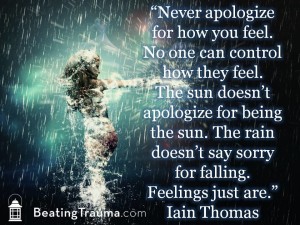This week, I had an image shared more than 15,000 times on Facebook. It brought 2,600 new members to the Beating Trauma community and I am extremely grateful. While the picture was beautiful, I think the quote stirred many people. It wasn’t my quote. The quote came from Iain Thomas, who is a popular author and blogger.
This quote resonates with me because I am tired of apologizing. I am who I am. I feel what I feel. And honestly, I think many can relate. But there were others who were not quite sure about it’s veracity. On larger pages, I noticed some comments that illustrated the common misperceptions about feelings. Several people suggested that feelings were to be controlled. One extreme comment referred to unapologetic feelings as leading to terrorism. In this case, there was a clear misunderstanding between controlling feelings and controlling actions.
There were others who ventured in to the debate over whether or not thoughts can control feelings. And there is much debate about this concept. I have been pondering this for years as I have worked through my own trauma recovery. But I am going to be bold and tell you that I know the answer.
The feelings come first. The thoughts come second.
There is a reason why this is so hard to figure out. We have been taught to tune emotions out. We don’t pay attention to our body. And after trauma, we take it to an extreme by dissociating. But nobody is telling us to stop thinking. Thinking is considered the most critical aspect of living in our world today.
So while we are supposed to live in our bodies and use our thoughts as a tool, we live in our minds and use our bodies as tools.
It comes as no surprise that our constant attention on our thoughts has us convinced it works the other way. And there are thousands of programs out there promoting the focus on changing our thoughts. Even many of the teachings about the law of attraction erroneously focus on thoughts. But if you have pent-up emotions, you already know that doesn’t work. You have probably tried it to no avail. I know I have.
If you have been reading my blog for a while, you may be wondering why I write about thoughts so much when feelings are where it’s at. That’s a fair question. There are two answers. First, thoughts are much easier to write about. Describing feelings is challenging especially when I have only recently learned to express emotions. Second, and far more important, tuning in to our thoughts can tell us about our feelings. Let me explain.
When I wake up in the morning, I usually have a lot of emotional activity in my body. I haven’t dissociated yet. I am not triggered at that exact moment (usually), so it allows me a few genuine moments of awareness without really trying. In those moments, my thoughts will tell me a story.
- If I wake up in the morning and immediately search the previous day for some example of embarrassment, I am feeling shame. When I realize that, I can sense the shame in my abdomen where it likes to sit.
- If I wake up in the morning and start worrying about how I will make it through to the day, I am feeling my old friend, anxiety. And for me, anxiety is a lack of agreement between my inner parts. In other words, it is my baseline state. If I can stay present and journal the concerns of my parts, this dissipates.
- If I wake up in the morning and I am resentful toward someone for negatively impacting my current life, I know I am feeling anger. I usually feel anger in my throat because of the years of silencing. If I can give voice to the anger through journaling, it dissipates.
- If I wake up in the morning and feel like nothing will ever be okay, I know I am embodying hopelessness. This often accompanies anxiety. And this is the most important feeling to recognize because it may lead to suicidal ideation. If I can stay aware that these thoughts are not about right now, I can come through it much better.
If I can stay aware, I always find the thoughts are not the cause of the feeling. The feeling is old. It comes from past trauma. And the thoughts are simply trying to make sense of it. The body feels one way, it sends messages to the mind, and the mind creates. That is what the mind does. And if we don’t recognize this, the mind will create all day, feeding the emotion. And that can make for a bad day.
So we must use our thoughts for clues about the body. But we can’t take it as truth. And we can’t believe thoughts will “fix” our emotions or body. They just won’t. There is only one things that will “fix” emotions. We must feel our emotions to heal. But we must feel them without attaching thoughts to them. We must dive deep in to our emotions without apology. When we do this, we will learn that our priorities have been mixed up for most of our life. And we will come home to our bodies where we belong.
Written By Elisabeth Corey, MSW
Which Comes First? Thoughts or Feelings? was originally published @ Beating Trauma and has been syndicated with permission.
Sources:
Our authors want to hear from you! Click to leave a comment
Related Posts







